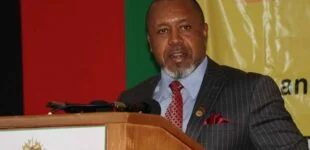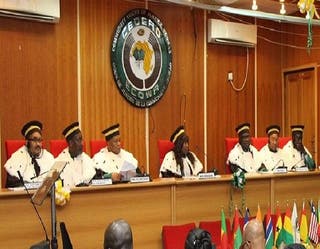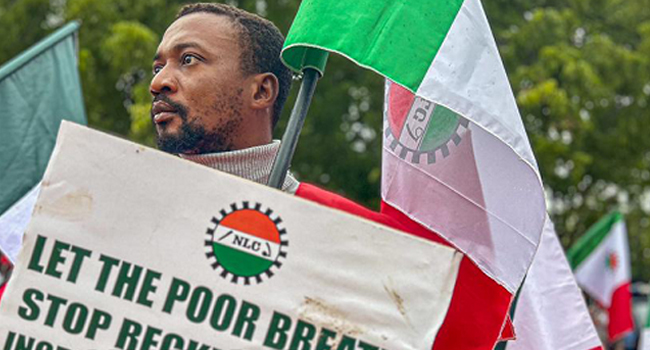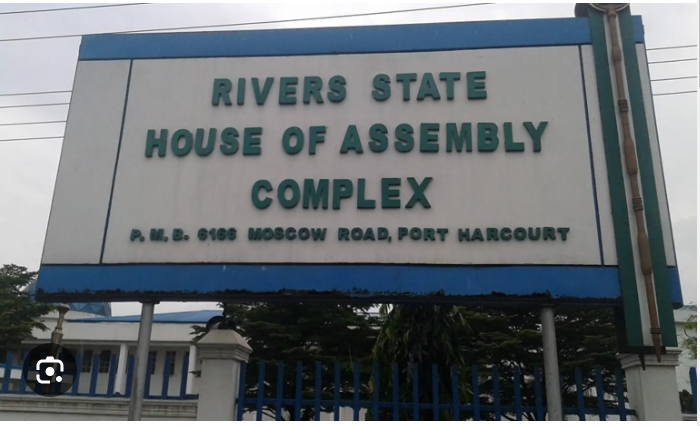The organised labour has vowed to reject any ₦62,000 or ₦100,000 minimum wage proposal for Nigerian workers by the federal government. Speaking in an interview on Channels Television on Monday, the Assistant General Secretary of the Nigeria Labour Congress (NLC), Chris Onyeka, described such a proposal as a “starvation wage”. Onyeka insisted that labour won’t accept the latest government’s offer of ₦62,000, saying that its latest demand as the living wage for an average Nigerian worker remains ₦250,000. He said, “Our position is very clear. We have never considered accepting ₦62,000 or any other wage that we know is below what we know can take Nigerian workers home. We will not negotiate a starvation wage. “We have never contemplated ₦100,000, let alone ₦62,000. We are still at ₦250,000, that is where we are, and that is what we considered enough concession to the government and the other social partners in this particular situation. We are not just driven by frivolities but the realities of the marketplace, realities of things we buy every day: a bag of rice, yam, garri, and all of that.” Onyeka said the one-week grace period given to the Federal Government to review its proposal last Tuesday, June 4, 2024, would expire by midnight on Tuesday, June 11, 2024. He said organised labour would meet to decide on the resumption of the nationwide industrial action if the Federal Government and National Assembly fail to act on workers’ demands by tomorrow. He added, “The Federal Government and the National Assembly have the call now. It is not our call. Our demand is there for them (the government) to look at and send an Executive Bill to the National Assembly, and for the National Assembly to look at what we have demanded, the various facts of the law, and then come up with a National Minimum Act that meets our demands. “If that does not meet our demand, we have given the Federal Government a one-week notice to look at the issues and that one week expires tomorrow (Tuesday). If after tomorrow, we have not seen any tangible response from the government, the organs of the organised labour will meet to decide on what next.” When asked what the decision of labour would be should the government insist on ₦62,000, he said, “It was clear what we said. We said we are relaxing a nationwide indefinite strike. It’s like putting a pause on it. So, if you put a pause on something and that organs that govern us as trade unions decide that we should remove that pause, it means that we go back to what was in existence before.” After weeks of failed talks on a new minimum wage for workers in the country, organised labour, comprising the NLC and TUC, embarked on a nationwide strike last Monday to demand a new wage and the reversal of the electricity tariff hike. The labour unions said the current minimum wage of ₦30,000 can no longer cater to the well-being of an average Nigerian worker, saying the government should offer workers something economically realistic in tandem with current inflationary pressures. However, the labour leadership suspended the strike for five days after signing a commitment with the Federal Government to resume negotiations and come up with a new minimum wage within a week. The suspension of the strike followed a six-hour meeting between the leadership of labour and the National Assembly in Abuja, on Monday night. To fast-track the talks, the President, last Tuesday, directed the Minister of Finance, Wale Edun, to present the cost implications for a new minimum wage within two days. Tinubu also directed the government representatives to work collectively with the organised private sector and the sub-nationals to achieve a new affordable wage award for Nigerians. On Thursday, the finance minister presented the cost implications of implementing a new national minimum wage to Tinubu at the Presidential Villa, alongside the Minister of Budget and National Planning, Atiku Bagudu. Before the directive, the minister described the proposal made by organised labour as “unaffordable. Also, the 36 state governors said labour union demand was not sustainable. However, on Friday, June 7, 2024, labour and the government failed to reach an agreement. While labour dropped its demand again from ₦494,000 to ₦250,000, the government added ₦2,000 to its initial ₦60,000 and offered workers ₦62,000. Both sides submitted their reports to the President, who is expected to make a decision and send an executive bill to the National Assembly to pass a new minimum wage bill, which the president will then sign into law.














